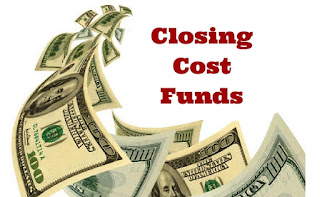The Funds Needed at Closing = "Cash to Close"
Gene Mundt's post does a great job of explaining to a buyer (and many agents too) what it takes to purchase a home. Buyers shouldn't have to wait to see the Closing Disclosure to understand "Cash To Close."
The Funds Needed at Closing = "Cash to Close"
"Cash to Close" ...
It's the term used in mortgage lending that refers to the final amount of money a Borrower needs to bring or send to their Closing on their Closing day.
But in today's modern mortgage process, "Cash to Close" actually means anything but cash when it comes time for you to produce funds at the time of your Closing.Why?Today's rule of thumb regarding mortgage closing fund requirements is: (Rules and practices vary from State to State, so for simplification, I refer to Illinois practices here.)
- Amounts under $50,000 are typically brought to Closing via a Cashier's Check
- Amounts of $50,000 and over are sent by wire from the Borrower's Bank to the Title Company's Bank
So HOW does your Mortgage Lender calculate the actual amount of your "Cash to Close" - Closing Funds?I've broken down the calculation I use for my typical Borrower: (Understand that your personal buying and financial scenario may vary from the below.)Total Down Payment- Minus: Any Earnest Money paid+ Plus: All Closing Costs- Minus: Any Credits due to the Buyer/Borrowerfrom the Seller, Mortgage Lender, orother allowed Credits at ClosingEquals = Closing Funds NeededWhen breaking down the "Cash to Close" equation: The simplest portion to understand and calculate is the first one mentioned ... the Down Payment. Commonly seen down payments are 3%, 3.5%, 5%, 10% or 20%.Questions regarding Down Payment ... and the benefits of each increment above ... are often the first questions I hear from my mortgage clients. In reality, the answer to the most commonly heard question ... "What's the "best" down payment?" ... is directly linked to the individual Borrower and best determined after a thorough discussion with your LO.(To help in that regard, here are 4 of my posts that help explain typical Down Payments, Down Payment Requirements, and mortgage options tied to them.)But a Down Payment is typically not the ONLY cash you'll need to Close. Closing Costs are often required as well.I find for my mortgage clients, that Closing Costs are the most misunderstood part of the "Cash to Close" equation. Many of my Borrowers don't know, prior to entering the mortgage process, that there are fixed costs associated with a mortgage ... costs that are to be paid by them, the Borrower.These Closing Costs can include:
- Credit Report(s)
- Attorney Fees (when utilized)
- Appraisal Fee
- Lender's Origination Fees
- Title Insurance Fee
- Title Settlement Fees
- Homeowners Insurance
- Tax Escrow (set-aside at Closing)
- HOA Dues (if applicable)
- Flood Certifications (where applicable)
- More, depending on the individual Borrower/Property
Borrowers need to know: Closing Costs can add up to thousands of dollars, depending on the individual transaction and the state/locale in which the transaction is taking place.Why does the location make a difference?
Certain locales (cites/towns, etc.) charge Buyers Real Estate Transfer Tax Fees. Some Sellers can insist on not paying those fees/costs. That is often negotiated and then reflected in the Sales Contract.It's important to note: These types of Closing Costs are not financeable on most all Conventional Loans ... and most all FHA and VA Loans, as well. That said, FHA and VA do allow certain "upfront" Mortgage Insurance and Funding Fees to be financed (added to the loan amount).Closing Cost Credits: Who doesn't love 'em ... especially when paid by someone else? Closing Cost Credits can even be "Lender Paid". But be aware, these credits do come with a cost.What are the costs most often associated with receiving Closing Costs Credits?Sellers typically raise their Sales Price. Mortgage Lenders typically raise the Interest Rate being charged the Borrower(s). FHA and VA allow their "upfront fees" to be "rolled -in ", or simply added to the Base Loan Amount (and charge Interest on that additional amount, as well).There are two (2) very important things to know regarding the "Cash to Close"/funds needed for your Closing:1. Know HOW your "Cash to Close" is calculated by your Lender.Remember: The final dollar amount you'll need at Closing will include any monies needed for costs associated with buying your house and taking out a Mortgage Loan ... ADDED to any Down Payment amount being made.2. Don't proceed until you thoroughly understand how the final dollar amount and "Cash to Close" was calculated.As you can see, there are many "moving parts" and things for Lenders to know and understand throughout your entire mortgage process. It pays to work with an experienced and knowledgeable mortgage originator, especially when you're waiting to hear about Cash to Close, the funds needed at Closing.In New Lenox and the greater Chicagoland area, contact me ...* Hoping to Buy or Refinance a Home in New Lenox or elsewhere in the Chicagoland area? Contact me! I'll put my 40+ years of Mortgage experience and expertise hard to work on your behalf.I'm easily found at:Gene MundtMortgage Originator - nmls #216987 - IL Lic. 031.0006220 - WI LicensedAmerican Portfolio Mortgage Corp.nmls #175656Direct: 815.524.2280Cell/Text: 708.921.6331eFax: 815.524.2281
Gene Mundt
Mortgage Originator - NMLS #216987
IL Lic. #031.0006220 - WI License #216987
NMLS #175656
Gene Mundt, Mortgage Originator, 40+ years of #mortgage experience, will offer you exemplary mortgage service and advice when seeking: #Conventional, #FHA, #VA, #Jumbo, #USDA, and Portfolio Loans in #Chicago and the greater Chicagoland region, including: The #Lincoln-Way Area, #Will County, (#New Lenox, #Frankfort, #Mokena, #Manhattan, #Joliet, #Shorewood, #Crest Hill, #Plainfield, #Bolingbrook, #Romeoville, #Naperville, #Wilmington, #Peotone, etc.), #DuPage County, the City of Chicago, #Cook County, and elsewhere within IL and Wisconsin.
Your Referrals & Testimonials are Always Greatly Appreciated!
Email Me .. to be added to my Mortgage & Real Estate Newsletter











Comments(3)